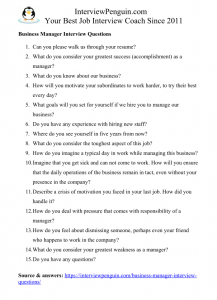Table of Contents
Can you please walk us through your resume?
Business manager should know a bit of everything–accounting, finance, recruitment, operations management, leadership, business development, process management. The list could go on. Once you walk them through your resume, try to point out varied experiences.
For example, if you led a small team before, or a department in some corporation, tell your interviewers about things you did there. Perhaps you set goals for the team, interviewed and hired new employees, tried to improve the processes within your team, and attended to daily problems and challenges.
They should get an impression that you understand the ins and outs of managing a business, that your previous experience (and perhaps also a degree in business management or business administration) prepared you for the role with them.
Do not forget to show some enthusiasm, and to talk positively about your experience. They should hear some excitement in your voice, and feel that you are looking forward to successfully manage their business.
What do you consider your greatest success (accomplishment) as a manager?
The most important thing is not the success you choose for your answer, but the way in which you describe this experience. Let me explain it with a help of an example. Let’s say that you managed a small team. You hired a new key player, improved some processes, motivated the employees and at the end the productivity of the team improved significantly. That’s what you did, but how will you narrate it in an interview? Check the two examples below:
In my last job I benefited from my excellent leadership skills and got the best out of each employee. We worked hard, and eventually achieved better results than before. My management changed everything.
I helped my last employer to increase the yearly sales volume by 30%, in two consecutive years. I succeeded in hiring some talented sales employees, improved the sales strategies and created motivating atmosphere in the team. With the help of my colleagues we eventually managed to improve the sales significantly, and I consider it my greatest achievement as a manager–or at least one I contributed to with my work.
The second description is much better, because the job applicant uses numbers (30%, 2 years), which gives their story more credibility. What’s more, they focus on the results of the employer (better sales volume, higher profits) and give credit to other team members. All interviewers will love such attitude.
But what to say if you have no real successes so far? Be honest. Everyone has to start somewhere. Even the best and most famous managers had their first job (or first business) one day. Tell the interviewers that you have not achieved anything great yet, but are hungry for success, and hope to achieve great things for your new employer.
Special Tip: Check also Sample answers to “What is your greatest professional achievement?”
What do you know about our business?
You should do your research. Try to understand their business from a perspective of a manager, and one of a customer. What sort of products they offer, what their target markets (customer segments) are, what marketing activities they apply, and so on.
If possible, try to praise them for something. This can be anything from quality products and great reputation, to creative marketing campaigns and competitive employee benefits. Basically anything that catches your eye once you do your research.
Talking about their strengths, you make it easier for you to build a good connection with your interviewers. Everyone is happy when someone praises them for their good work. And such a connection can pay big time at the end of the interviews.
At the same time, however, you should also mention some challenges, or perhaps even some ideas for improvement. Because if everything worked perfectly, they would not need a new manager…
How will you motivate your subordinates to work harder, to try their best every day?
Employee motivation belongs to most common challenges managers face across all industries and business fields. Hence you will certainly get at least one question about motivating employees.
Try to show holistic approach to your managerial work. Basic ideas, such as reward and punishment, or a small raise each 6 months, won’t impress any hiring manager. Try to be more creative, and suggest ways of motivating people that won’t cost your employer extra money.
For example, you can say that you will try to build the right atmosphere in the team, so people feel responsible for each other, enjoy their time in work, have good relationships, and understand their role. This may include introducing some new polices or even hiring/firing some staff members.
You can also say that you will go by an example, and will also help your employees to see the connection between their goals and the goals of the company. Communication is the key, and you believe to have the leadership skills in you.
* May also interest you: Operations manager interview questions.
What goals will you set for yourself if we hire you to manage our business?
You have two options at this point. First one is saying that before setting any goals, you will talk to the business owners (or executives), trying to understand their expectations, as well as what numbers (in terms of sales volume, profit, etc) they would like to reach at the end of the year. Knowing the numbers, you should be able to translate them into your goals and your work as a manager.
Another option is identifying areas for improvement, and making them your goals. This can be anything from improving the business reputation or employee turnover to generating XY new sales a year, or even making the company finally profitable (if they continue to be in red numbers).
Do you have any experience with hiring new staff?
Be honest. If you have no experience, you can always refer to cooperating with external consultants of recruitment agencies (at least at the beginning) to ensure you’d meet your staffing needs. You can also always use great websites like InterviewPenguin.com, to help you learn how to lead an interview :).
And if you have experience, talk about some successful hires you made before. You can refer to your sourcing strategies (talent acquisition, job ads, referrals from existing employees, LinkedIn, etc), or even to some interesting interviewing techniques you used before.
One way or another, you should show confidence in your ability to hire new employees. Employees come and go, that’s the fact, and you will certainly need to bring new people onboard while managing a business. Ensure the interviewers that you either have this ability, or are capable of learning how to do it effectively.
Where do you see yourself in five years from now?
Honestly, managing someone else’s business is the best preparation for running your own business. You will acquire connections in the industry, learn the ins and outs of daily operations, you will succeed and fail. But you will take the risks with someone else’s money, and you will even receive a nice monthly paycheck for doing it :).
And maybe this is your plan, maybe you will become their competitor one day, but you should not talk about these plans in your interview. The exact opposite is true.
Ensure them that you have no plans of running your own business. What’s more, you understand it takes time until you help them reach the pinnacle. Therefor you want to work as a business manager in five years time, and hope that your excellent results will allow you to still have the job within their company…
Some other questions you may face in your business manager interview
- What do you consider the toughest aspect of this job?
- How do you imagine a typical day in work while managing this business?
- Imagine that you get sick and can not come to work. How will you ensure that the daily operations of the business remain in tact, even without your presence in the company?
- Describe a crisis of motivation you faced in your last job. How did you handle it?
- Why did you choose this business?
- How do you deal with pressure that comes with responsibility of a manager?
- How do you feel about dismissing someone, perhaps even your friend who happens to work in the company?
- What do you consider your greatest weakness as a manager?
- Do you have any questions?
* You can also download the full list of questions in a one page long PDF, and practice your interview answers anytime later:
Conclusion, next steps
Business manager is a vague and fancy job title that typically attracts dozens (if not hundreds) of applications. You will compete with many people for the job, which makes your situation much more difficult. How to stand out? How to beat the competitors and walk away with a new job contract?
That’s not an easy question. First and foremost, you should do your best to prepare for the interviews. Do your research, prepare for all questions from this article, and try to get rid of interview nerves. Try to build a good connection with your interviewers, and remember that body language also matters.
At the end of the day, you will need also a bit of luck. Something must click between you and the interviewers. It may happen one time, and may not on another occasion. Job search is a game of numbers. Do not get discouraged if they don’t hire you this time. You just met the same fate like 99% of applicants for managerial jobs… Learn from your mistakes, and try with another employer. I wish you good luck!
Matthew
May also interest you:



